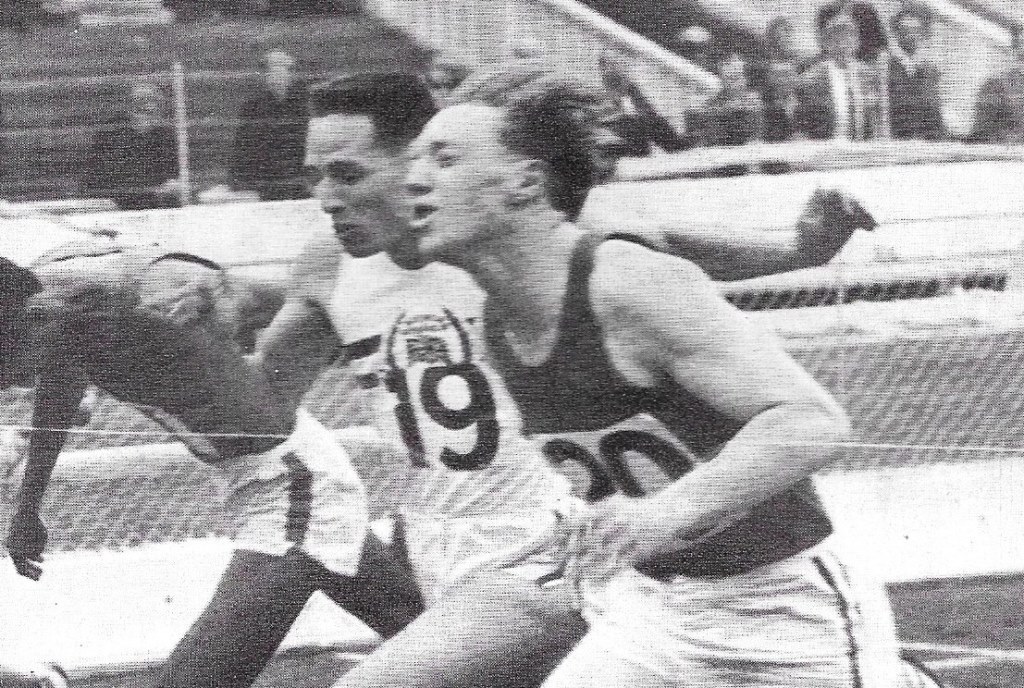Jackson column: Berwyn Jones paid the price for putting family first

Champ: Berwyn Jones (20) wins the 1963 AAA 100 yards title from Ron Jones (19)
By Peter Jackson
Berwyn Jones used to run like the wind, so much so that not even the so-called fastest man on Earth, Bob Hayes, could catch him. At London’s White City in the summer of 1963, the Welshman famously held off the unbeaten America on the last leg of Britain’s world record-breaking sprint relay win over the US.
The victory, rounded off by one Jones with the help of two more, Ron and David, and Peter Radford, sprang out of the history books in Cardiff the other night with Berwyn’s posthumous induction into the Welsh athletics’ Hall of Fame, eleven years after his death in Ross-on-Wye at the age of 66. Ironically, both he and Hayes left the track for very different codes of football.
A schoolteacher from Rhymney who had played a bit of Union for the local club, Jones was the first to change sport. His signing for Wakefield Trinity Rugby League club in April 1964, was all the more sensational because it came out of the blue and cost him the chance of an Olympic medal at the Tokyo Games later that year.
Jones considered the fee, reputedly £6,000, sufficient compensation. With the Welsh flier safely out of his line of vision, Hayes lived up to the ‘Bullet Bob’ hype and scorched away with the gold before cashing his chips in with the Dallas Cowboys.
Under athletics’ rules, Jones could no longer continue to compete as an amateur sprinter while playing professionally in another sport. Rugby Union enforced the same rule but applied it only to those who were cast out for daring to put family security first on the pragmatic basis that no amount of Corinthian spirit would ever pay the mortgage.
That other rugby players could earn money as professionals in other theatres of sport without it affecting their amateur status made the whole business a laughing stock. Dusty Hare continued to push his world points record ever higher into the stratosphere, despite playing county cricket for Notts.
Dave Gaskell used to be the babe of the Busby Babes, at 16 the youngest goalkeeper ever to play for Manchester United. When he left Old Trafford after 14 years on the payroll, he reinvented himself as a back row forward for Wrexham Rugby Club.
Ray Cheney began to make a name for himself as a footballer way back in the early Fifties when Spurs found South Wales a fertile area for likely lads. They had signed Ron Burgess from Ebbw Vale at round about the time when Wales picked Cheney at centre forward for their youth team.
There was talk, or so it was said, of Spurs being interested. They did come back to the Rhondda a little while later, not for Cheney from Porth but for a young lad by the name of Mel Hopkins from neighbouring Ystrad. By then Ray had taken the hint and started kicking goals of a different kind.
During 14 years in first-class rugby from the second half of the Fifties to the start of the Seventies, he set records wherever he went, for Pontypool, Newport and Cardiff. Over a six-year period he lined up at full-back in club matches against the Springboks, All Blacks and Wallabies.
Few players can have made as much out of their one crack at New Zealand as Cheney did for Newport in between losing to South Africa for a combined Pontypool-Cross Keys XV and helping Cardiff beat Australia at the Arms Park. On Rodney Parade’s day of days, October 30, 1963, Cheney achieved the distinction of helping Newport keep the cleanest of sheets.
It ensured that his long-range penalty rebounding off the New Zealand crossbar made no difference to a result clinched on the strength of ‘Dick’ Uzzell’s famous skimmer of a drop-goal. Fifty years later, Newport made the entire team freemen of the city.
The grand old survivors remembered the glory days last Friday in the course of paying their last respects to Ray Cheney at the Gwent Crematorium in Croesyceiliog. He died last month at the age of 82, leaving his wife, Sue, sons Tim and Robin, daughters Pauline and Karen.